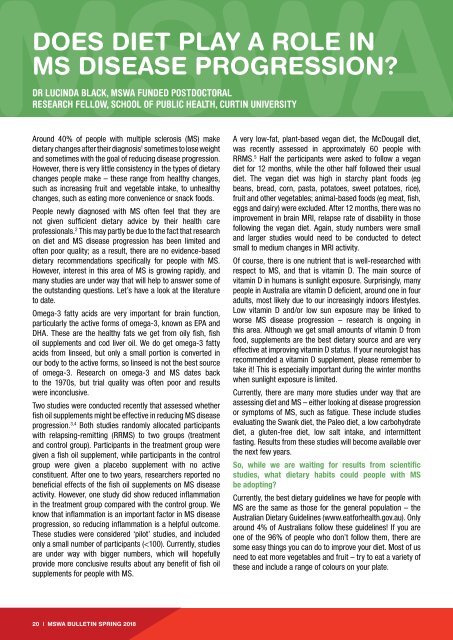Create successful ePaper yourself
Turn your PDF publications into a flip-book with our unique Google optimized e-Paper software.
DOES DIET PLAY A ROLE IN<br />
MS DISEASE PROGRESSION?<br />
DR LUCINDA BLACK, MSWA FUNDED POSTDOCTORAL<br />
RESEARCH FELLOW, SCHOOL OF PUBLIC HEALTH, CURTIN UNIVERSITY<br />
Around 40% of people with multiple sclerosis (MS) make<br />
dietary changes after their diagnosis 1 sometimes to lose weight<br />
and sometimes with the goal of reducing disease progression.<br />
However, there is very little consistency in the types of dietary<br />
changes people make – these range from healthy changes,<br />
such as increasing fruit and vegetable intake, to unhealthy<br />
changes, such as eating more convenience or snack foods.<br />
People newly diagnosed with MS often feel that they are<br />
not given sufficient dietary advice by their health care<br />
professionals. 2 This may partly be due to the fact that research<br />
on diet and MS disease progression has been limited and<br />
often poor quality; as a result, there are no evidence-based<br />
dietary recommendations specifically for people with MS.<br />
However, interest in this area of MS is growing rapidly, and<br />
many studies are under way that will help to answer some of<br />
the outstanding questions. Let’s have a look at the literature<br />
to date.<br />
Omega-3 fatty acids are very important for brain function,<br />
particularly the active forms of omega-3, known as EPA and<br />
DHA. These are the healthy fats we get from oily fish, fish<br />
oil supplements and cod liver oil. We do get omega-3 fatty<br />
acids from linseed, but only a small portion is converted in<br />
our body to the active forms, so linseed is not the best source<br />
of omega-3. Research on omega-3 and MS dates back<br />
to the 1970s, but trial quality was often poor and results<br />
were inconclusive.<br />
Two studies were conducted recently that assessed whether<br />
fish oil supplements might be effective in reducing MS disease<br />
progression. 3,4 Both studies randomly allocated participants<br />
with relapsing-remitting (RRMS) to two groups (treatment<br />
and control group). Participants in the treatment group were<br />
given a fish oil supplement, while participants in the control<br />
group were given a placebo supplement with no active<br />
constituent. After one to two years, researchers reported no<br />
beneficial effects of the fish oil supplements on MS disease<br />
activity. However, one study did show reduced inflammation<br />
in the treatment group compared with the control group. We<br />
know that inflammation is an important factor in MS disease<br />
progression, so reducing inflammation is a helpful outcome.<br />
These studies were considered ‘pilot’ studies, and included<br />
only a small number of participants (


















